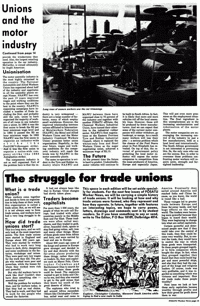
Image: pdffiles.in
Introduction
The bustling labor landscape of South Africa is intricately interwoven with the presence of trade unions. Like mighty rivers shaping the land, these organizations have played a pivotal role in steering the course of workers’ rights and economic justice. In this comprehensive guide, we delve deep into the history and significance of trade unions in South Africa, shedding light on their unwavering commitment to empowering workers and shaping the nation’s socio-economic landscape.
Trade unions in South Africa, a force to reckon with, have their roots firmly planted in the struggles of the apartheid era. Born out of the collective resistance against oppressive labor practices, these organizations became symbols of hope and solidarity for marginalized workers. Their tireless efforts in advocating for fair wages, better working conditions, and social rights transformed them into beacons of change in the country’s fight for equality.
Historical Evolution
The trade union movement in South Africa can be traced back to the late 19th century, when skilled workers in the mining and manufacturing industries began forming craft unions. However, it was not until the rise of the African National Congress (ANC) and the anti-apartheid movement in the 20th century that trade unions gained widespread support and recognition.
During the tumultuous years of apartheid, trade unions became instrumental in mobilizing workers against racism and exploitation. Their unwavering commitment to workers’ rights and their ability to unite workers across racial and economic divides played a pivotal role in the fight against the oppressive regime.
Post-Apartheid Era
The end of apartheid marked a new chapter for trade unions in South Africa. With the advent of democracy, these organizations faced new challenges and opportunities. The transition to a post-apartheid society brought about a need for reconciliation and economic transformation, and trade unions took on the mantle of ensuring that workers were not left behind in the process.
In the post-apartheid era, trade unions have continued to play a crucial role in shaping labor policies and advocating for workers’ rights. They have played a pivotal role in the development of minimum wage legislation, social security benefits, and occupational health and safety regulations.
Structure and Membership
Trade unions in South Africa operate under the guiding principles of democracy and worker representation. They typically comprise a federation of affiliated unions, each representing workers in a specific industry or sector. Membership in trade unions is voluntary, with workers choosing to join and contribute to support the organization’s activities.
Functions and Objectives
The primary functions of trade unions in South Africa are to protect and advance the interests of their members. Their objectives include:
-
Collective Bargaining: Negotiating wages, benefits, and working conditions with employers on behalf of their members.
-
Representation: Representing members in grievance procedures, legal disputes, and disciplinary hearings.
-
Education: Providing training and knowledge to members on labor laws, union activities, and related topics.
-
Mobilization: Organizing and engaging members in protests and campaigns to raise awareness about labor issues.
Benefits of Trade Unions
Joining a trade union offers numerous benefits to workers in South Africa:
-
Collective Power: Trade unions provide workers with a collective voice and enable them to have a say in matters that affect their working lives.
-
Improved wages and benefits: By negotiating with employers, trade unions strive to secure better wages and benefits for their members.
-
Representation and support: Trade unions provide legal representation and support to members in workplace disputes.
-
Training and education: Trade unions offer training and educational programs to help members develop skills and knowledge.
-
Social justice: Trade unions advocate for social justice and equality, promoting equal opportunities for all workers.
Conclusion
Trade unions in South Africa stand as a testament to the power of collective action in achieving economic justice and social equality. Their unwavering commitment to workers’ rights has left an enduring mark on the nation’s history and continues to inspire generations of workers. As the South African labor landscape evolves, trade unions remain indispensable allies in the fight for a just and equitable society for all workers. Their enduring spirit serves as a reminder that unity, solidarity, and a passion for social justice can conquer even the most formidable challenges.

Image: www.sahistory.org.za
Trade Unions In South Africa Pdf






